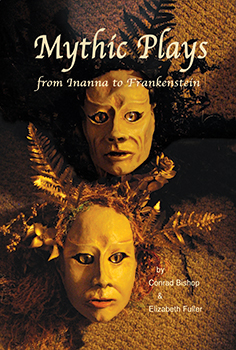
Mythic Plays – From Inanna to Frankenstein
 Spanning five thousand years of human experience, Mythic Plays includes four dramas evolved from collaboration with American theatres by playwrights Conrad Bishop and Elizabeth Fuller and The Independent Eye. From Greek myth (Medea/Sacrament), Norse saga (Ragnarok: Doom of the Gods), Sumerian archetype (Descent of the Goddess Inanna) and Mary Shelley’s “Modern Prometheus,” Frankenstein, these plays offer highly readable models for a synthesis of poetry, visual theatre, and the immediate reality of myth.
Spanning five thousand years of human experience, Mythic Plays includes four dramas evolved from collaboration with American theatres by playwrights Conrad Bishop and Elizabeth Fuller and The Independent Eye. From Greek myth (Medea/Sacrament), Norse saga (Ragnarok: Doom of the Gods), Sumerian archetype (Descent of the Goddess Inanna) and Mary Shelley’s “Modern Prometheus,” Frankenstein, these plays offer highly readable models for a synthesis of poetry, visual theatre, and the immediate reality of myth.
(193 pp., paperbound, $19.95 + $4.00 shipping) Buy Now
THE DESCENT OF THE GODDESS INANNA
I’m never surprised at the depth of vision and imagination I experience in the theater presentations of Conrad Bishop and Elizabeth Fuller. In their production of the Descent of Inanna, they and their performance partners have taken that step further which leads from theater into realms of myth and enchantment – a literally breath-taking adventure. To watch this millennia-old story of death and resurrection come to life in a small-town hall-for-rent of twenty-first century America is not what I usually expect for an evening’s entertainment. Breathtaking and unforgettable! ~ KRCB-FM
The myth is recreated in a contemporary setting that melds easily into the timeless Sumerian story. When handled by writers and producers as gifted as Bishop and Fuller, the myth still speaks to us today. ~ Gus diZerega, author, Pagans & Christians and Beyond the Burning Times
Poetic, timeless and transcendent, Inanna satisfies that place in us all that hungers for the nourishment of the mythic realm. ~ Anodea Judith, author, Wheels of Fire
MEDEA/SACRAMENT
Making ancient myth as current as today’s headlines is no easy matter, but that’s what Bishop and Fuller have accomplished quite stunningly in their Medea/Sacrament. ~ The Bergen Record
RAGNAROK
The ensemble of ten pulls out the stops to tell the story of the pagan gods awaiting their long-heralded doom. Underpinning it all is a very topical anxiety: security, the trade-off between love and safety emphasized over and over. Is the return of Thor’s hammer worth the loss of the goddess of Love as a hostage bride? Or is the building of unbreachable walls for their haven, Asgard, an exchange for Freya, who makes life worth living, who is in fact the wellspring and continuity of life itself?
This post-Christian, secular Humanist-ized treatment of myth veers back and forth between the irony of Plato and the burlesque of a Fractured Fairy Tales cartoon. You don’t have to wait till the end of the world to enjoy yourself. ~ Berkeley Daily Planet
FRANKENSTEIN
We all know the story of Frankenstein, but no version has revealed the feelings of all the major characters with such intensity. This Frankenstein successfully counteracts the popular mythology that has flattened Shelley’s serious themes and insights, which are still relevant nearly 200 years later. ~ Main Line Times
The Independent Eye has looked at what has become a hackneyed story and made it new and original; it’s fun that catches you up short with its seriousness. ~ Philadelphia Weekly
Bishop’s puppets and Mary Shelley’s story turn out to be a well-suited match, making for a strangely beautiful, visually arresting spectacle of inanimate oddness. Gone are the horror-science-fiction cliches (no electricity, no grave-robbing), replaced by a more intimate story of a damaged, increasingly angry soul in search of love, who, denied the family he desires, ends up settling for revenge. ~ North Bay Bohemian
